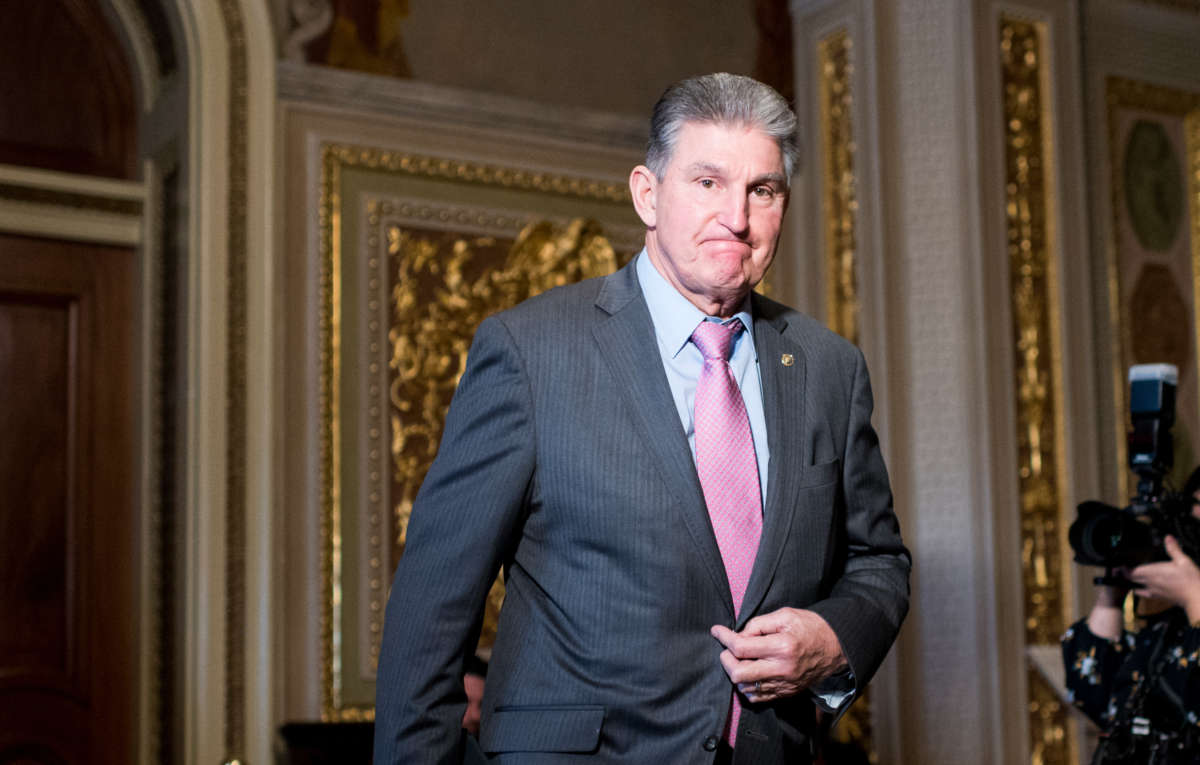Sen. Joe Manchin (D-West Virginia) said in a virtual meeting with President Joe Biden on Monday that he wanted the stimulus package to be narrower in its aid to the public, and that he wanted cuts to the unemployment checks included in this round of funding.
Manchin joined a group of centrist Democrats who said that they’re going to push for less aid in the upcoming $1.9 trillion stimulus package. Manchin specifically said that he wanted the coronavirus aid included in the bill to be “targeted,” reports Roll Call.
The bill currently includes $400 unemployment checks per week through August, which is already a cut from the CARES Act from last year that gave unemployed people $600 checks a week.
In the meeting, Manchin said he’d prefer that the checks were $300 instead, in response to largely Republican fears that unemployed people were making more than they would if they had a job. As of 2018, according to OpenSecrets, Manchin was worth over $7.6 million.
Manchin reiterated his alignment with Republicans on the next round of stimulus checks at Monday’s meeting, saying that he wanted the income threshold for the $1,400 checks to be lowered. Republicans have previously proposed that the threshold be lowered from individuals making $75,000 a year to individuals making $50,000 a year, a threshold that Manchin embraced, but which Democrats had previously rejected.
Don’t miss a beat
Get the latest news and thought-provoking analysis from Truthout.
Over the past several weeks of negotiations over the stimulus package, called the American Rescue Plan, Manchin has stood against many of the Democratic and progressive ideas that have been proposed in the relief bill — including some that emerged while Donald Trump was president. Progressives have warned that Manchin’s insistence on lowering the income eligibility for the relief checks, and his opposition to the $15 federal minimum wage and the abolition of the filibuster, have made him a target for possible primaries from the left.
Manchin argues that his ideas about cuts to the stimulus are in service of “helping the people that need help the most,” he said on Monday. But basing aid on Republican talking points about cutting down unemployment benefits, some argue, isn’t the best path forward for the economy or for helping people who are hurting during the pandemic.
Some people who received the initial round of $600 unemployment checks, for instance, said that the checks were a lifeline while they were furloughed and making less than what they normally would, or when they were also helping to support those who weren’t fully unemployed but had their work hours cut due to COVID.
Many economists have also roundly rejected the idea that the extra unemployment checks discourage people from finding work. Josh Bivens, a research director at the progressive Economic Policy Institute, wrote in a blog last year that, “In normal times, economists and policymakers have focused a lot of attention (almost surely too much) on the incentive effects of [unemployment insurance] benefits.” But studies have found that, “The negative economic impacts of these incentive effects have always been exaggerated,” says Bivens, and that they’re negligible, especially under the exigent circumstances caused by the pandemic.
If the idea of the stimulus package is to stimulate economic activity, the unemployment checks also help with that. As Bivens also notes, unemployment benefits are very efficient in increasing household spending. Bivens points to a House testimony by Harvard economist Jason Furman in which Furman presents projections showing that if the U.S. were to keep the $600 unemployment checks until 2022, the checks alone would support 3 million jobs.
Similar analyses have not been done on the smaller checks, but it’s natural to assume that the economic benefits would be lower if the checks are lower. Manchin, however, may not be as worried about the economic benefits of the stimulus as he is about government spending; recent reporting by West Virginia’s Charleston Gazette-Mail found that Manchin has an aide text him how much the national debt has grown every morning.
When the third round of relief checks was first being discussed in Washington, Manchin initially balked at the amount of money the checks would cost the federal government when asked about it by The Washington Post. He later clarified that, if they were found to stimulate the economy, then he would be in favor of them.
But the previous rounds of stimulus checks — which went to the higher threshold of income earners that Manchin has been opposed to — do have the effect of stimulating the economy even if they do end up as savings, experts have found.
Our most important fundraising appeal of the year
December is the most critical time of year for Truthout, because our nonprofit news is funded almost entirely by individual donations from readers like you. So before you navigate away, we ask that you take just a second to support Truthout with a tax-deductible donation.
This year is a little different. We are up against a far-reaching, wide-scale attack on press freedom coming from the Trump administration. 2025 was a year of frightening censorship, news industry corporate consolidation, and worsening financial conditions for progressive nonprofits across the board.
We can only resist Trump’s agenda by cultivating a strong base of support. The right-wing mediasphere is funded comfortably by billionaire owners and venture capitalist philanthropists. At Truthout, we have you.
We’ve set an ambitious target for our year-end campaign — a goal of $250,000 to keep up our fight against authoritarianism in 2026. Please take a meaningful action in this fight: make a one-time or monthly donation to Truthout before December 31. If you have the means, please dig deep.
